#chris cwej
Explore tagged Tumblr posts
Text

if there’s one thing about me, i love an alignment chart
#doctor who#memes#dweu#expanded universe#edas#eighth doctor adventures#vnas#virgin new adventures#big finish#eighth doctor#compassion#charley pollard#chris cwej#ace mcshane#irving braxiatel#fitz kreiner#the master#sabbath dei#sam jones#iris wildthyme#c’rizz#anji kapoor#my posts
199 notes
·
View notes
Text


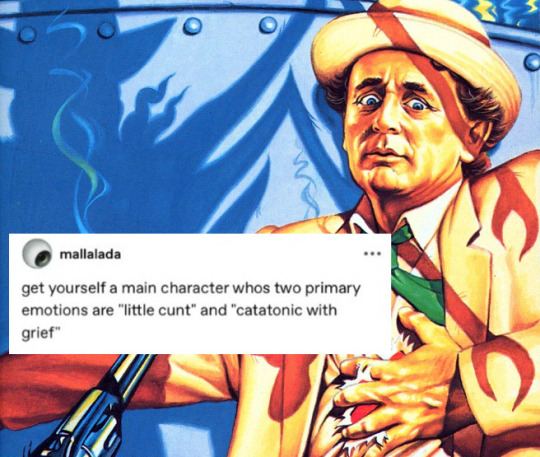


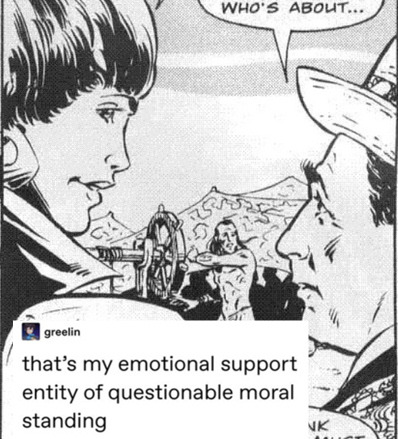


some more specifically VNA-flavored ones for u
EDIT: forgot one of my favorites </3
part 1 | part 2
#gibber#dw#doctor who#virgin new adventures#vnas#seventh doctor#7th doctor#bernice summerfield#ace mcshane#roz forrester#chris cwej#text post meme#doctor who text post
103 notes
·
View notes
Text
A Virgin New Adventures reading guide
I told @gotyouanyway that I'd give them my reading guide for the Virgin New adventures that I made for a friend a while back and posting it publicly was easy and also means other people can use this too. I wrote this back in 2021, but stand by it from what I remember. It has been like 5-6 years since I read some of these books, so if I rated your favorite too low lemme know and I'll give it a re-read.
This might not be that helpful if you want to pick just a few books - I designed it more to streamline VNA experiance
The key:
1 - I'd recommend skipping
2 - Eh. You can skip, but there is at least something to be gained by reading it
3 - I would recommend reading this. It's not plot-critical, but it is a good read or useful setup
4 - Read this for sure. It's either plot-relevant, or just that damn good (or both).
Timewyrm: Genesys - 4 (introduces the timewyrm and the series; unfortunately it's also not great.)
Timewyrm: Exodus - 3 (continues the timewyrm story, and is a fairly straightforward but interesting story)
Timewyrm: Apocalypse - 2 (eh. Not much for or against it either way)
Timewyrm: Revelation - 4 (concludes the timewyrm arc with style)
Cat's Cradle: Time's Crucible - 3 (Good if you can wrap you head around it)
Cat's Cradle: Warhead - 2 (depressing as all get out, but very well written)
Cat's Cradle: Witch Mark - 3 (just plain weird. Does finish the current arc and sets up Return of the Living Dad)
Nightshade - 2 (kinda weird. Notable as the first Mark Gatiss story)
Love and War - 4 (plot-relevant. Also awesome)
Transit -4 (Introduces important recurring character. Hard to follow but really good even if you can't follow it)
The Highest Science - 3 (good story, but ultimately not amazingly important)
The Pit - 1 (I did not enjoy)
Deceit - 4 (Not a great read, but important to the plot)
Lucifer Rising - 4 (Amazing, with important character development for our protagonists)
White Darkness - 2 (first David A. McIntee novel, but not especially gripping)
Shadowmind - 3 (good demonstration of where Ace and Benny are as characters, vaguely interesting plot)
Birthright - 3 (good character piece for Ace and Benny, shows a darker side to the Doctor without being dumb about it)
Iceberg - 2 (plot is messy and weird. Only read if you need the Doctor's half of the story from Birthright)
Blood Heat - 4 (starts alternate universe arc, important developments for the Tardis)
The Dimension Riders - 2 (gonna be honest here - I don't remember a thing about this one either way)
The Left-Handed Hummingbird - 3 (first Kate Orman novel. Pretty good, although a little weird and hard to follow)
Conundrum - 3 (Be prepared for weirdness. And superheroes. Helps setup for No Future and Head Games)
No Future - 4 (concludes the alternate universe arc with style, establishes Ace from here on out)
Tragedy Day - 3 (dark, but good. Worth a read)
Legacy - 3 (Kinda dark, but it works. Be prepared for over-continuity)
Theatre of War - 4 (Pulls off one of the best plot twists I've seen anywhere, and introduces Braxieatel to the Whoniverse)
All-Consuming Fire - 4 (Not plot-relevent at all, but is very good, especially if you are a Sherlock Holmes fan)
Blood Harvest - 4 (Major plot point in the Whoniverse)
Strange England - 2 (takes strangeness to an art form. Can be freely skipped)
First Frontier - 4 (plot relevant for spoiler-y reasons)
St Anthony's Fire - 2 (dark and weird, but well written)
Falls the Shadow - 1 (Just... no)
Parasite - 1 (Written by Jim Mortimore, therefore depressing as all get out)
Warlock - 2 (I did not read. Sequel to Warhead, so only read if you liked it)
Set Piece - 4 (major plot developments for multiple characters)
Infinite Requiem - 2 (like The Dimension Riders, I remember nothing)
Sanctuary - 3 (a pure historical. Not really great on its own, but helps set up Human Nature)
Human Nature - 4 (The story that was adapted to TV. One of the best New Adventures by itself, becomes even better by having fun comparing it to the TV version)
Original Sin - 4 (plot-relevant)
Sky Pirates! - 2 (Only if you like Douglas-Adams-esque dark humor)
Zamper - 3 (Somewhat interesting follow-up to The Highest Science)
Toy Soldiers - 2 (Adds pretty much nothing, but not painfully bad)
Head Games - 4 (a worthwhile look at where the Doctor has been going and who he is)
The Also People - 4 (probably my favorite New Adventure, although Theatre of War and Human Nature are also up there. Also resolves a recurring character's arc)
Shakedown - 3 (Fun, but ultimately fluff)
Just War - 2 (Weird and ultimately unimportant)
Warchild - 2 (Same situation as Warlock. Starts Psi arc, but can be skipped)
SLEEPY - 4 (Generally good story, sets up Psi arc if you skipped Warchild)
Death and Diplomacy - 3 (only worthwhile as setup for Happy Endings)
Happy Endings - 4 (Plot relevant. Ultimately fluff, but plot-relevant)
GodEngine - 4 (not plot-relevant, but an excellent story)
Christmas on a Rational Planet - 2 (part of Psi arc, and lays groundwork for Faction Paradox stuff, but I couldn't really follow it)
Return of the Living Dad - 4 (cleans up old plot threads, and is a great story in its own right)
Cold Fusion - 4 (Not plot relevant, but an excellent, gripping story)
The Death of Art - 2 (part of Psi arc, but not great)
Damaged Goods - 2 (Russel T. Davis's first Who work, but very dark and nasty)
So Vile a Sin - 4 (finishes Psi arc and has other plot relevance)
Bad Therapy - 2 (deals mostly with repercussions of previous story, but not great in and of itself)
Eternity Weeps - 1 (Jim Mortimore's writing is too depressing for me. Technically plot relevant in that Benny and Jason get divorced but not worth it)
The Room With No Doors - 4 (setup for Lungbarrow, good story in its own right)
Lungbarrow - 4 (concludes the new adventures of the seventh doctor in a surprisingly meaningful way)
The Dying Days - 4 (a nice little coda to the series that sets up Benny's adventures as well)
#doctor who#doctor who eu#doctor who expanded universe#dweu#virgin new adventures#doctor who vnas#doctor who virgin new adventures#dw vnas#dw vna#dw virgin new adventures#seventh doctor#ace mcshane#bernice summerfield#chris cwej#roz forrester
89 notes
·
View notes
Text
Random Doctor Who Facts You Might Not Know, Part 6
The Fourth Doctor once almost drowned in a lake while following giant cat footprints.
While "pimping up" Bessie, the Eleventh Doctor turned her into a monster truck.
The Seventh Doctor takes five to six sugars in his tea.
The Seventh Doctor once admitted that he enjoyed destroying worlds.
The Second Doctor once found parts of the Sixth Doctor's outfit in his TARDIS wardrobe. He decided that he would never wear such a thing.
Khavûl, the main enemy in the "Chronomancer" audio starring the Sixth Doctor, Mel Bush, and Hebe Harrison, is a Drornidian and a Paradox Mage. The planet Drornid would play an important role during the War in Heaven.
In the far future where it is not meaningful to measure time, Evelyn Smythe became a CyberController.
While training to be an astronaut, Steven Taylor played the titular character in a stage production of Hamlet.
The Eighth Doctor has kept kittens in his pockets before.
Chris Cwej has used body bepples, a form of genetic alteration that can change one's physical appearance. He has taken the forms of a person-sized teddy bear and a catboy with tufted ears.
The Doctor was given an avatroid named Badger when he was very young because he needed a tutor, friend, and protector. Badger gives literally almost rib-cracking hugs.
When Rose Tyler and the Tenth Doctor considered getting a pet for the TARDIS, they found a pet store that was run by peaceful Cybermen. Only when Rose protested against the conversion of mice to Cybermice did the Doctor defeat the Cybermen.
The Second Doctor was once seen offering a prayer to "the gods of his own people."
The Eighth Doctor also took Charley Pollard back in time to kill the would-be dictator as a baby but was foiled as well.
The Second Doctor can play the recorder hanging upside down.
Through his forced regenerations, the Doctor lost the ability to make a good soufflé.
The Master once set Jo Grant up on a date with Mike Yates.
Dalek casings are made of polycarbide and dalekanium.
Rose Tyler was once infected with a lagnon grub, so the Tenth Doctor put her into a dream where he was dating Jackie and Mickey had an Amazonian girlfriend. The resulting jealousy drove the grub from her body.
While most future incarnations looked at the First Doctor with deep respect, the Eleventh Doctor did not, calling him a selfish idiot and a coward.
Glitterguns are effective weapons against the Cybermen.
Part 1, 2, 3, 4, 5, 6, 7, 8, 9, 10, 11, 12, 13, 14, 15, 16, 17, 18, 19, 20, 21, 22, 23, 24, 25, 26, 27, 28
#doctor who#dw#dr who#classic who#new who#big finish doctor who#big finish audios#big finish#dw eu#doctor who eu#doctor who expanded universe#eighth doctor#fifth doctor#sixth doctor#tenth doctor#first doctor#eleventh doctor#rose tyler#chris cwej#steven taylor#evelyn smythe#second doctor#charley pollard#the master#jo grant#mike yates#war in heaven#mel bush#hebe harrison#fourth doctor
209 notes
·
View notes
Text
Chris Cwej should have ended up in the 21st century building high tech fursuits not working for the Time Lords and evolving into his own clone species. get my boy out of there 😔
30 notes
·
View notes
Text
youtube
So in 2014 I uploaded a fan made Lungbarrow soundtrack, to say it was rudimentary would be an understatement! But as 2024 was both the tenth year anniversary of the original fan soundtrack's release and the tenth anniversary of my nan's passing, the person who really pushed to get me into music... I figured a complete overhaul and reworking with a shiny new system was in order!
You'll find the whole video above, and if you check out my channel, you will find suites and tracks based on other Doctor Who New Adventure novels!
Please check it out if you're interested, more will be coming soon!
#doctor who#lungbarrow#house of lungbarrow#gallifrey#Doctor Who Virgin New Adventures#Seventh Doctor#Romana#Doctor Who Ace#Chris Cwej#Innocet#Doctor Who fandom#dr who#First Doctor#Susan Foreman#Roz Forrester#vnas#Doctor Who Music#musicians on tumblr#Youtube
20 notes
·
View notes
Text
Do you know this doctor who character?
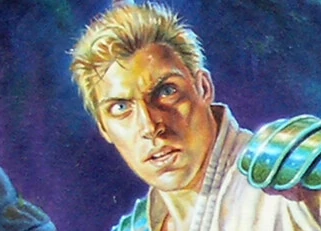
Chris Cwej.
Bisexual furry bodymodder from the future
(Submitted by @third-doctor)
32 notes
·
View notes
Text
Waiting for the Gallifrey audio fans to notice the mention of the Braxiatel book series in the introduction to the Cwej hardback like
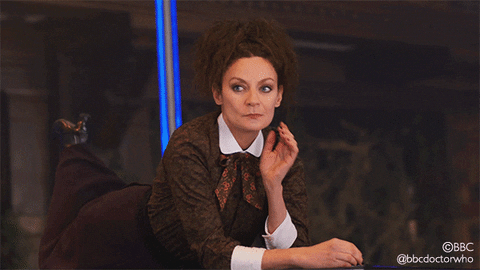
#gif#described#cwej: the series#Cwej: the complete first cycle#arcbeatle press#irving braxiatel#braxiatel#chris cwej#gallifrey#just like. Waiting
11 notes
·
View notes
Text
𝘈𝘳𝘣𝘪𝘵𝘳𝘢𝘵𝘰𝘳𝘴 𝘙𝘰𝘴𝘢𝘮𝘶𝘯𝘥 & 𝘒𝘳𝘪𝘴𝘵𝘰𝘧𝘧 𝘢𝘭𝘰𝘯𝘨𝘴𝘪𝘥𝘦 𝘵𝘩𝘦 𝘮𝘺𝘴𝘵𝘦𝘳𝘪𝘰𝘶𝘴 '𝘊𝘩𝘪𝘳𝘶𝘳𝘨𝘦𝘰𝘯'

#warhammer 40k#doctor who#miniature painting#roz forrester#chris cwej#seventh doctor#my painting#40k#warhammer#pretty happy with them#especially the cirurgeon's little badge
25 notes
·
View notes
Text
"Long ago, a man who traveled across worlds made a promise to a girl trapped in a hospital, but now that oath has led them both into mystery, as students vanish around a lost film… "Shutter Speed" a fresh entry point to join in the Cwej: The Series adventure!"
I had the pleasure and honor of getting to write the Cwej: the Series Easter special, I really hope you enjoy it!
13 notes
·
View notes
Text
Cruk
From AHistory, 3rd edition:
2010 The word, “cruk” was introduced in the anime series, "Bones and Kay" and quickly caught on as a mild expletive.
2025 The word, “cruk” was very rude by 2025, (.V.N.A. 7 Love and War, .V.N.A. 50 Happy Ending). 26th century A means of expressing their displeasure, (.B.F. Death an the Daleks). Other One of two Arviem 2 robots said, "cruk it" after Bernice Summerfield tricked them and blew off their arms, (.B.F. The Revolution). Chris Cwej. (Cwej: A Bright White Crack, Ring Theory, .e.t.c.).
We have a chance to make a piece of Who Lore real, (at least amongst ourselves) and incorporate it into stories set in the present day of next year.
#vna#Happy Endings#thee wedding#cruk#2025#ahistory#Lance Parkin#Lars Pearson#Paul Cornell#cruking#oh cruk#crukking hell#cruk you#whovian#expletive#swearword#bernice summerfield#love and war#cwej the series#chris cwej#cwej#faction paradox#doctor who#bbc doctor who#whoniverse#classic who#classic doctor who#nuwho#modern who#dw
13 notes
·
View notes
Text








some recent-ish VNAs stuff
#my art#dw#seven#ace mcshane#bernice summerfield#chris cwej#roz forrester#first two pics are about Set Piece and Oh No It Isn't! respectively#and death. death is there as well#jason kane#doctor who#vnas#virgin new adventures
46 notes
·
View notes
Text

15 notes
·
View notes
Note
Chris Cwej
or Compassion?
Or the 2nd Morbius Doctor (the one in World War Two) if you’ve read forgotten lives.
If not those then something with Rodan
Chris Cwej fic right here! (+ an obligatory Braxiatel appearance because i'm nothing if not predictable)
i honestly hadn't thought about Chris much before (i like him but thinking about his timeline starts to make my head hurt) but i had a lot of fun writing this!
#three fics in three days. y'all this is unheard of. hopefully i'll have a fourth tomorrow#chris cwej#vnas#irving braxiatel#benny series#my posts#my fanfic#asks
5 notes
·
View notes
Text

They don't make doctor who stories like they used to :(
#chris cwej#this was written by RTD btw#vnas#Damaged Goods#doctor who eu#seventh doctor#Chris Cwej just has the wildest timeline ever#like wtf happened to him post lungbarrow
9 notes
·
View notes
Text
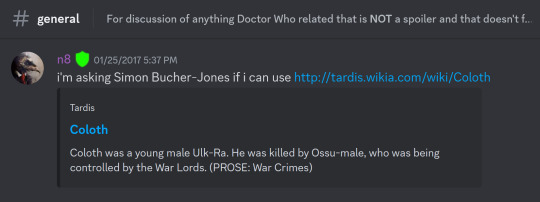
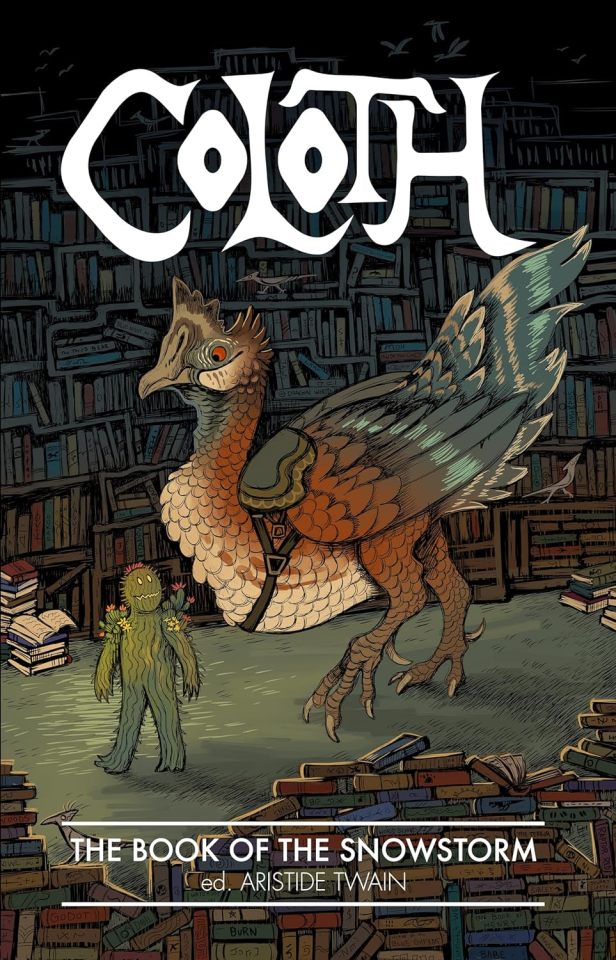
7 years later: Coloth has arrived.
The Book of the Snowstorm, brilliantly crafted and compiled by @aristidetwain, is AVAILABLE NOW in print, epub, and Kindle!
It includes a new story from me, “The First Noël”, as well as literally dozens of other stories. Welcome to the Library – just be sure to wear something cozy. Winter has arrived!
#coloth#the book of the snowstorm#arcbeatle#can't understate how thrilled I am about this release#the first noel#chris cwej#arcbeatle press#auteur#lucy wilson#?!?!?!???!#i do such nice things with formatting and then tumblr sabotages me lol#hopefully you're viewing this on tumblr.com/doctornolonger rather than doctornolonger.tumblr.com
36 notes
·
View notes